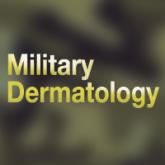Original Research

Physician Skin Examinations for Melanoma Screening
A variety of estimates of the value and impact of physician skin examinations (PSEs) in screening for melanoma have been published. Although...
Dr. Rosenberg is from Walter Reed National Military Medical Center, Bethesda, Maryland. Dr. Meyerle is from the Department of Dermatology, Uniformed Services University of the Health Sciences, Bethesda.
The authors report no conflict of interest.
The opinions expressed in this article are solely those of the authors and should not be interpreted as representative of or endorsed by the Uniformed Services University of the Health Sciences, the US Army, the US Navy, the Department of Defense, or any other federal government agency.
Correspondence: Jon H. Meyerle, MD, Uniformed Services University of the Health Sciences, Department of Dermatology, 4301 Jones Bridge Rd, Bethesda, MD 20814 (jon.meyerle@usuhs.edu).

Currently, there are multiple limitations to the implementation of TBP as a part of TBSE screening. First, the potential improvement in biopsy efficiency using TBP is predicated on its ability to prove nevi stability over time, but in younger populations, benign nevi are more likely to change or increase in number, which may reduce the biopsy efficiency of screening in a younger population, thereby negating some of the benefit of imaging and CNN assessment. For instance, Truong et al16 found that younger age (<30 years) did not show the same improvement in biopsy efficiency with the use of TBP, which the authors theorized may reflect “the dynamic nature of nevi in younger patients” that has been documented in other studies.23,24 Approximately 65% of the active-duty military population is aged 18 to 30 years, and 98% of accessions to active duty occur in individuals aged 17 to 30 years.25 As such, TBP may not improve biopsy efficiency in the active-duty military population as dramatically as it would across the general population.
A second limitation of the use of TBP in the active-duty military population is the ethics of implementing DoD-wide mandatory TBP. Although the TBP platform will be compliant with the Health Insurance Portability and Accountability Act, mandating that soldiers contribute their TBP to a repository of data that will then be used for research without explicitly requesting their consent is ethically problematic; however, since the 1950s, the DoD has collected serum samples from its service members for force protection and operations reasons as well as for the purpose of research.22,26 Currently, the DoD Serum Repository collects serum samples as part of a mandatory human immunodeficiency virus screening program that evaluates service members every 2 years; this repository of human serum samples is accessible for research purposes without the consent of the individuals being studied.27 These individuals are not informed of potential use of their serum specimens for research purposes and no consent forms or opt-out options are provided. Thus, although there is precedent in the DoD for such mass data collection, it is an ongoing ethical consideration.28
RELATED ARTICLE: Gigapixel Photography for Skin Cancer Surveillance
Finally, although the potential use of TBP and computer algorithms to improve the efficiency and affordability of TBSEs is exciting, there are no existing computer algorithms that we are aware of that can be used with existing TBP platforms in the manner we proposed. However, we feel that computer algorithms, such as the one created by Esteva et al,19 are just the beginning and that the use of artificial intelligence is not far off. Even after the creation of a TBP-compatible algorithm adept at analyzing malignant lesions, however, this technology would need to be further evaluated in the clinical setting to determine its capability and practicality. Current TBP platforms also are limited by their large size, cost, and complexity. As TBP platforms improve, it is likely that more streamlined and less expensive versions of current models will greatly enhance the field of teledermatology, particularly in the military setting.

A variety of estimates of the value and impact of physician skin examinations (PSEs) in screening for melanoma have been published. Although...

Protection from UV radiation (UVR) is of paramount importance in preventing skin cancers, the majority of which occur on sun-exposed areas of the...

Psoriasis is a common dermatologic problem with a chronic and sometimes debilitating course. Psoriasis can impair a service member’s ability to...
